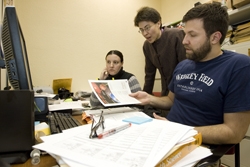Improving science education in high school and beyond
New research grants to investigate barriers on the path to becoming a scientist
The National Science Foundation has awarded two new grants to investigators in Temple University’s colleges of Education, Liberal Arts and Science and Technology to help strengthen the supply of future scientists.
These awards come at a time when it is critical to support U.S. productivity and advancement in today’s global economy by building scientific talent and knowledge.
“Fewer American students are finishing bachelor’s degrees in science, technology, engineering, and mathematics (STEM),” said principal investigator, Jennifer Cromley, an assistant professor of educational psychology in the College of Education. “We are trying to figure out why, in order to meet the need for trained scientists, inventors and technical personnel in the United States.”
The grants, for approximately $1 million each, cover three years and focus on science education at both the high school and college levels.
The first grant seeks to understand why some students who start out as STEM majors change majors, whether it’s after one course or after completing almost all of the work. Nationally, only a small portion of students who begin as life sciences majors as freshmen graduate with degrees in the life sciences. Ultimately, the goal is to create intervention programs to retain more students in the sciences in order to build a larger pool of scientists.
The researchers will follow about 600 freshmen taking chemistry and biology courses in each year of the grant and will look at both students’ abilities and their perceptions of whether their abilities can grow. Previous research suggests that students who believe they can become more able — that is, students who believe their abilities are more malleable — put more effort into courses, are less afraid to seek help and perform better academically. Additionally, such students are more resilient after an academic setback, attribute their successes more to their own effort, and are more focused on understanding material as opposed to focusing solely on grades.
Cromley’s co-principal investigators reach across disciplines and include Erin Horvat, associate professor of urban education at the College of Education; and Jacqueline Tanaka, associate professor of biology, and John Mitchel, general chemistry coordinator, at the College of Science and Technology.
Through the second of the two grants, researchers will teach high school students how to understand the diagrams in their science textbooks.
For the study, researchers will provide high school biology teachers with four different techniques to boost students’ ability to understand diagrams. Additionally, researchers will use eye-tracking data to determine how students reason through and understand the information in the illustrations. For some, making sense of diagrams is difficult; Cromley’s previous studies revealed that many students skip right over diagrams as they read through textbook content.
As with the first grant, the goal here is to ultimately increase the retention of students studying science, thereby increasing the numbers of qualified scientists in future generations. But with this grant, goals will be achieved through better understanding about biology learning at the high school level.
Cromley also serves as a principal investigator on this study, along with Nora Newcombe, professor of psychology, and Thomas F. Shipley, associate professor of psychology, both at the College of Liberal Arts; and Jacqueline Tanaka, associate professor of biology at the College of Science and Technology.
These grants are just two of several research initiatives now underway at Temple that are designed to increase the STEM skills and knowledge of students at all age levels and to keep interested students on the path to STEM careers.
